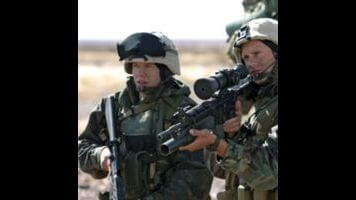Generation Kill: "Screwby"

For every year of its five-season run, The Wire was the best show on television. And every year, critics like me whined that it’s never got any Emmy recognition, having apparently failed to convince voters that it met the high standards of quality set by the likes of Boston Legal and Grey’s Anatomy. But here’s some consolation: David Simon probably hates awards more than anyone on Earth, and would likely feel he did something wrong to win one. On the last season of The Wire, the top editors at the fictionalized Baltimore Sun were so wrapped up in Pulitzer-grubbing that they allowed a career-minded fantasist to run roughshod while missing all the important stories about what was really happening in their city.
Echoes of the Sun subplot ran through tonight’s episode of Generation Kill, in which the top brass engaged in a far more dangerous brand of awards-grubbing (or medals-grubbing, in this case). Last week’s triumph—the escape from an ambush on the streets of a hostile city with no casualties—curdled quickly into bitterness among many of the grunts. “Yesterday,” one of them says, “We ran the gauntlet with no ass and no air. And for what? Fucking artillery blew the shit out of that town after we rolled into it.” The men know that things could have gone much worse very easily, since they’re forging ahead without armor for their Humvees, without gun lube, and with no solid assessment as to the number, location, and strength of the enemy. They fought bravely and skillfully, and wound up affirming a poor decision from leadership, one that of course earns Godfather plaudits from the higher-ups.
We can see that the Godfather’s strategy—and by strategy, I mean for his advancement, not for the safety and success of the mission—is to be “proactive” in breaking from the pack and sending his Marines off to engage the enemy first. It’s one of those strategies that sounds better than it is: After all, being aggressive and taking the war to the enemy keeps you on the offensive. But the men, even those seemingly grateful to “get some” rather than wait through traffic and endless pregnant pauses, realize that they’re doing the job artillery units and air support can do more effectively. Or at least soften up the territory before they can come in to sweep up.
Godfather’s gung-ho spirit gets the unit into trouble two more times in this episode: First when they’re left exposed on the outskirts of a hostile town, absorbing fire right out in the open. Artillery support is called in, but they’re 200 meters from the enemy, which puts them at “danger close,” a term used to indicate that friendly forces are within 600 meters of the target. We then witness the farce of Fisk having to defy a superior officer in order to convince Godfather not to “drop arty” on his own company. Then later, Godfather orders the men to decamp prematurely from their station and head off on an all-night drive to a faraway airfield, where they’re to face up to 4,000 Republican Guard troops to their 350. When they wind up seizing the abandoned airfield the next morning with no fight, Colbert surmises that they could just as easily been wiped out. Here, Godfather can make all sorts of claims that sound wonderful—how they claimed a whole airfield, including several tanks and other vehicles, and lost not a single man doing it—and he looks like a genius.
Beyond detailing the self-serving incompetence of leadership, “Screwby” brings the relationships among rank-and-file further into focus. (Again, like The Wire, it takes some patience to get through the getting-to-know-you stage in order for the dramatic payoffs to happen. I’d probably put that as the primary reason the show never got Emmy love or high ratings.) On approach to the airfield, Colbert and his men get into some trouble because of Trombley, an unstable young gunner who turns out to be an excellent shot—except he’s not killing everyone and everything but the enemy. His first bit of action results in a couple of camels meeting their maker, but we find out later than a second round of fire resulted in a civilian boy getting mortally wounded, too.
The Iraqi boy creates a combustible situation: The men are obligated (and eager) to have the kid evacuated for treatment, or else he’s going to die. Godfather tells him such a thing isn’t possible, because his initiative has taken them deep behind enemy lines and getting the boy back for medical attention via air or ground would put them at too high a risk. Besides (and this is where things get really insidious), wounded civilians are only supposed to get medical care equivalent to local standards. And since “the standards here are fucking zero,” they can just let the boy die.










![Rob Reiner's son booked for murder amid homicide investigation [Updated]](https://img.pastemagazine.com/wp-content/avuploads/2025/12/15131025/MixCollage-15-Dec-2025-01-10-PM-9121.jpg)

























![HBO teases new Euphoria, Larry David, and much more in 2026 sizzle reel [Updated]](https://img.pastemagazine.com/wp-content/avuploads/2025/12/12100344/MixCollage-12-Dec-2025-09-56-AM-9137.jpg)



